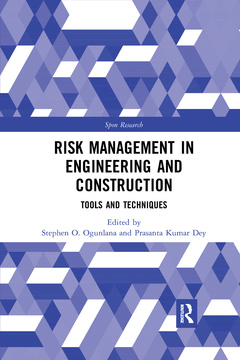Description
Risk Management in Engineering and Construction
Tools and Techniques
Spon Research Series
Coordinators: Ogunlana Stephen, Dey Prasanta Kumar
Language: English
Subjects for Risk Management in Engineering and Construction:
Keywords
Vice Versa; Analytic Network Process; Public Private Partnerships; Risk Events; AHP; Influence Diagrams; Causal Loop Diagram; Business Process; ERP Implementation; PRM; PPP Project; Work Package; Pairwise Comparison Matrix; Literature Review; Pairwise Comparison; ERP System Selection; Risk Management Framework; Risk Management Processes; ERP Project; Cpt; Risk Modelling Process; Landfill Site Selection; Prioritized Failure Modes; Supply Chain Risk Assessment; NPD Project
Publication date: 09-2021
· 15.6x23.4 cm · Paperback
Publication date: 09-2019
352 p. · 15.6x23.4 cm · Paperback
Description
/li>Contents
/li>Readership
/li>Biography
/li>
Today?s businesses are driven by customer ?pull? and technological ?push?. To remain competitive in this dynamic business world, engineering and construction organizations are constantly innovating with new technology tools and techniques to improve process performance in their projects. Their management challenge is to save time, reduce cost and increase quality and operational efficiency. Risk management has recently evolved as an effective method of managing both projects and operations. Risk is inherent in any project, as managers need to plan projects with minimal knowledge and information, but its management helps managers to become proactive rather than reactive. Hence, it not only increases the chance of project achievement, but also helps ensure better performance throughout its operations phase.
Various qualitative and quantitative tools are researched extensively by academics and routinely deployed by practitioners for managing risk. These have tremendous potential for wider applications. Yet the current literature on both the theory and practice of risk management is widely scattered. Most of the books emphasize risk management theory but lack practical demonstrations and give little guidance on the application of those theories. This book showcases a number of effective applications of risk management tools and techniques across product and service life in a way useful for practitioners, graduate students and researchers. It also provides an in-depth understanding of the principles of risk management in engineering and construction.
0
Prelims
Introduction
Prasanta Dey
1
Monte Carlo Simulation as a Risk Management Tool in Construction and Engineering Projects
Isaac A. ODESOLA and Dubem I. IKEDIASHI
2
Modelling Risk effect using Monte Carlo Technique: An Application for Innovative Projects
Ibrahim Motawa
3
A Structural Equation Modelling Approach for Assessing the Impact of External/Internal Risk Factors on Management Risk
VALADIS MALESSIOS
4
Risk management using combined multiple criteria decision-making technique, risk mapping, and decision tree: Oil refinery construction project
Prasanta Kumar Dey
5
Risk Management Practices in the Vietnamese Construction Industry using Bayesian Belief Networks Approach
Van Truong Luu, Soo-YONG Kim, Nguyen Van Tuan, and Stephen O. Ogunlana
6
The use of the analytical hierarchy and network process for risk management
Jonathan Nixon and Prasanta Kumar Dey
7
Project Risk Management Using Fuzzy Theory
Daniel Wright and Prasanta Kumar Dey
8
Development of Influence Diagram for Assessing Risks
Djoen San Santoso
9
Risk Assessment in Construction and Engineering Projects with SDANP plus
Prince Boateng
10
Delphi Technique in Risk Assessment
Djoen San Santoso
11
Risk Management in Enterprise Resource Planning Implementation Projects
Prasanta Kumar Dey, Ben Clegg and Walid Cheffi
12
Risk Management in Oil and Gas Construction Projects in Vietnam
Nguyen Van Thuyet, Stephen Ogunlana and Prasanta Kumar Dey
13
Risk Allocation Assessment through Good Project Governance Concept: A Case Study of PPP Project in Thailand
Martinus Abednego and Stephen O. Ogunlana
14
Risk-Based Inspection and Maintenance: A Case of Oil Pipeline Operations in India
Prasanta Kumar Dey
15
Managing Construction Risks and Uncertainties - A Management Procurement and Contracts Perspective
Oyegoke Adekunle Sabitu and Oluwaseyi A. Awodele
16
Risk Management Practice in Construction Projet: A Case Study on the NHS PFI Hospital Project in the UK
Farid Ezane Mohamed Ghazali, and Mastura Jaaafar
17
Managing Risk Management Knowledge
John Edwards & Eduardo Rodriguez
18
Infrastructure Development in the UAE: Communication and Coordination Issues Amongst Key Stakeholders
Moza T. Al Nahyan, Amrik S. Sohal, Brian Fildes, and Yaser E. Hawas
19
Supply Chain Risk Assessment in Automotive New Product Development
Atanu Choudhuri
20
To Investigate the Feasibility of Predicting, Identifying and Mitigating Latent System Failures in a UK NHS Paediatric Hospital
Anthony Sinclair
21
The Risks and Benefits of Climate change Policy on Business Operation: a System Dynamic Analysis
Tsalis T., Konstandakopoulou F. Evangelinos K., and Nikolaou E.I.
22
Political risk management during instability: The Experience of Readymade Garment Manufacturing firms in Bangladesh.
Krishnendu Saha
Stephen O. Ogunlana is currently the Chair of Construction Project Management at the School of Energy, Geoscience, Infrastructure and Society at Heriot-Watt University, Scotland. He has an international reputation for research in the application of system dynamics to construction projects and organizations. He is the author of over 200 scholarly publications in journals and conferences. His research has been funded by several governments. His works on leadership were awarded Emerald Literati Award for two consecutive years for the most outstanding paper in the Engineering, Construction and Architectural Management journal. He has a continuing interest in technology innovation for project management and in public-private partnerships for infrastructure delivery.
Prasanta Kumar Dey is a Professor of Operations Management at Aston Business School. He has been honoured as 50th Anniversary Chair of Aston University in 2017. Prior to joining Aston University in 2004, he worked for five years at the University of the West Indies in Barbados and for 14 years at Indian Oil Corporation Limited. He specializes in supply chain management and project management, and circular economy. He has published more than 150 research papers in leading international refereed journals. He has accomplished several impactful interdisciplinary research projects on a sustainable supply chain of small- and medium-sized enterprises (SMEs), which were funded by leading bodies such as the Research Council UK, British Council, Royal Society, Royal Academy of Engineering, EU Horizon 2020 and ERDF. He is the founder editor-in-chief of the International Journal of Energy Sector Management.




